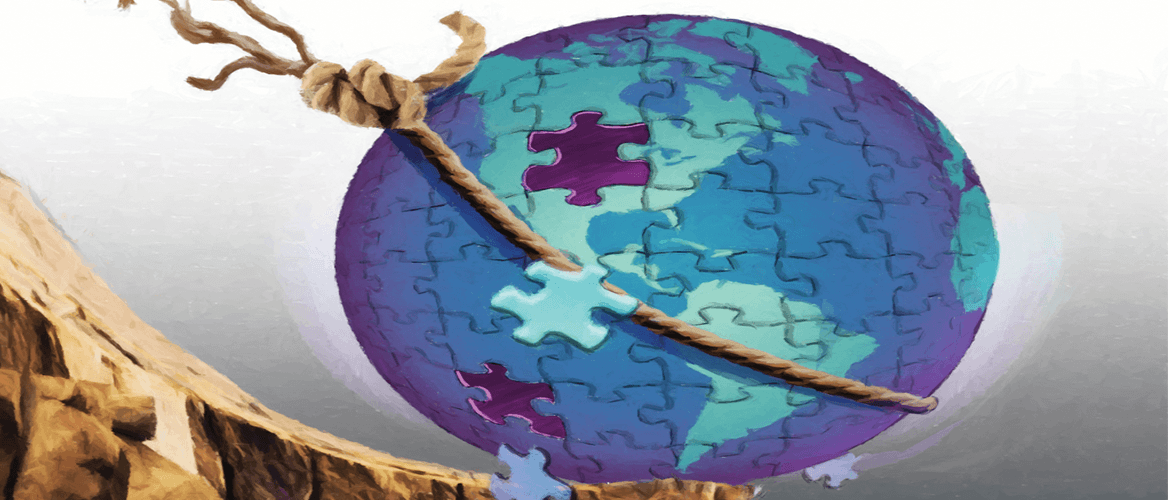The King Is Dead, Long Live the King! -Part 3
July 15, 2020 | Expert Insights

In this final part of the series, the author lists two more shortcomings of the U.S.-led Liberal World Order − the failure of the global war on terrorism and the emerging challenge of cybercrime
Shortcoming 4: Terrorism
In 2001, after the attack on the twin towers in New York, President George Bush Jr. declared the Global War on Terrorism (GWOT), with the goals of bringing Osama bin Laden and al-Qaeda to justice and to prevent the emergence of terrorist networks. This was to be accomplished by several means, including economic sanctions, military action, increasing global surveillance, and intelligence sharing. World leaders expressed solidarity with the American commitment.
Analysis
As part of the GWOT, the U.S. invaded Afghanistan in 2001 and Iraq in 2003 and the existing governments were ousted from power. Ten years later in 2011, U.S. forces finally hunted down Osama bin Laden, from Abbottabad in Pakistan. Later the same year, the U.S. withdrew from Iraq, and in 2013, President Barak Obama declared that GWOT was over and that U.S. troops would be progressively withdrawn from Afghanistan.
In retrospect, the withdrawal from Iraq was premature, for in the vacuum created, the ISIS grew under the leadership of Abu Bakr al-Baghdadi. The ISIS institutionalised terror, with carefully choreographed mass public beheadings and even using child executioners. At its height in January 2015, the ISIS controlled almost 88,000 sq. km of territory in northern Iraq and Syria, with approximately eight million residents. In 2014, two years after they had formally withdrawn, U.S. forces re-entered Iraq. This time, to specifically defeat the ISIS as part of the international coalition, including contingents of the U.K., France, Belgium, the Netherlands, Denmark, Italy, Canada, and Australia. The U.S.-led coalition fought alongside the Kurdish-led Syrian Democratic Forces (SDF), and Russia and Syrian armed forces − all united in the battle against the ISIS. By March 2019, the ISIS was defeated and Baghdadi was killed. All three parties (U.S., Russia, and the SDF) took credit for the victory. However, while the ISIS may no longer hold territory, they are still conducting terrorist activities and have reportedly moved sleeper cells to other locations, including Nigeria and the Philippines.
Assessment:The U.S. may claim that the GWOT was over in 2013, but the scourge of terrorism still vandalises the world in Africa (Congo, Somalia, Sudan, Mali, Kenya, Nigeria), Middle East (Saudi Arabia, Yemen), South Asia (Sri Lanka, Pakistan, Afghanistan, India), and Europe (France, U.K., Spain, Germany). When the U.S. declared the GWOT in 2001, terrorism was ill-defined and it remains so even today. The UN General Assembly has been negotiating the ‘Comprehensive Convention on International Terrorism’ since 2000, but negotiators remain in deadlock over the very definition of terrorism. Terrorists continue to cross national borders to escape law enforcement, and remain ‘un-prosecutable’ because of jurisdictional rights and expatriation complications.
Recommendation: In the new world order, it is hoped that there will be greater cooperation between national law enforcement agencies. Terrorists and fugitives should not be able to escape prosecution by escaping national borders. Nation states should also be held accountable if they provide safe havens and material support to individuals allegedly involved in cross-border crimes.
Shortcoming 5: Cybercrime
We live in a networked world with increasing dependence on cyber activities. Cyberspace, unlike physical space, has no borders. However, while cyber freedom has empowered the citizens of the world, it has also increased vulnerability to cybercrime. Three increasingly popular cybercrimes are phishing scams to gain access to your credit cards and online bank accounts; identity theft to make you responsible for actions you did not commit; and online harassment for psychological advantage. In 2018, a study by the Center for Strategic and International Studies (CSIS) and McAfee concluded that close to US$ 600B (1% of global GDP) was being lost to cybercrime every year.
Analysis:Why are we so vulnerable to cybercrime? Cybercrime should be easier to investigate because cyber footprints can be tracked. However, national crime investigation faces hurdles when the cyber footprint crosses international borders. Here, like terrorists and international criminals, the cybercriminal also steals a march over national law enforcement. In 2001, in order to regulate the use of transnational cyberspace and prosecute cybercrime more efficiently, the first treaty on cybercrime, called the Budapest Convention on Cyber Crime, was drafted. However, as of 2019, only 64 states had ratified the treaty. Countries like China, India, Brazil, Egypt, and Russia have so far declined to adopt the treaty.
Why are nation states hesitant to join? Though we live in an increasingly integrated and interconnected world, national law-enforcement remains restricted to national boundaries. Transnational spaces need to be monitored and regulated by empowered international organisations, working in close cooperation with national law enforcement. Perceptions of lacking of credibility and failing to demonstrate impartiality with the absence of equitable representation, have inhibited the growth of international organisations entrusted with global governance.
Conclusion
It is fair that we recognise the achievements of the U.S.-led LWO in the fields of national self-governance, human rights, and international cooperation. In the emerging world order, the young global community aspires for more. National governments should commit to ‘rule of law’ in global spaces. However, the surrender of (some) national sovereignty should be inspired by international organisations that are meritocracies, committed to impartiality.








Comments